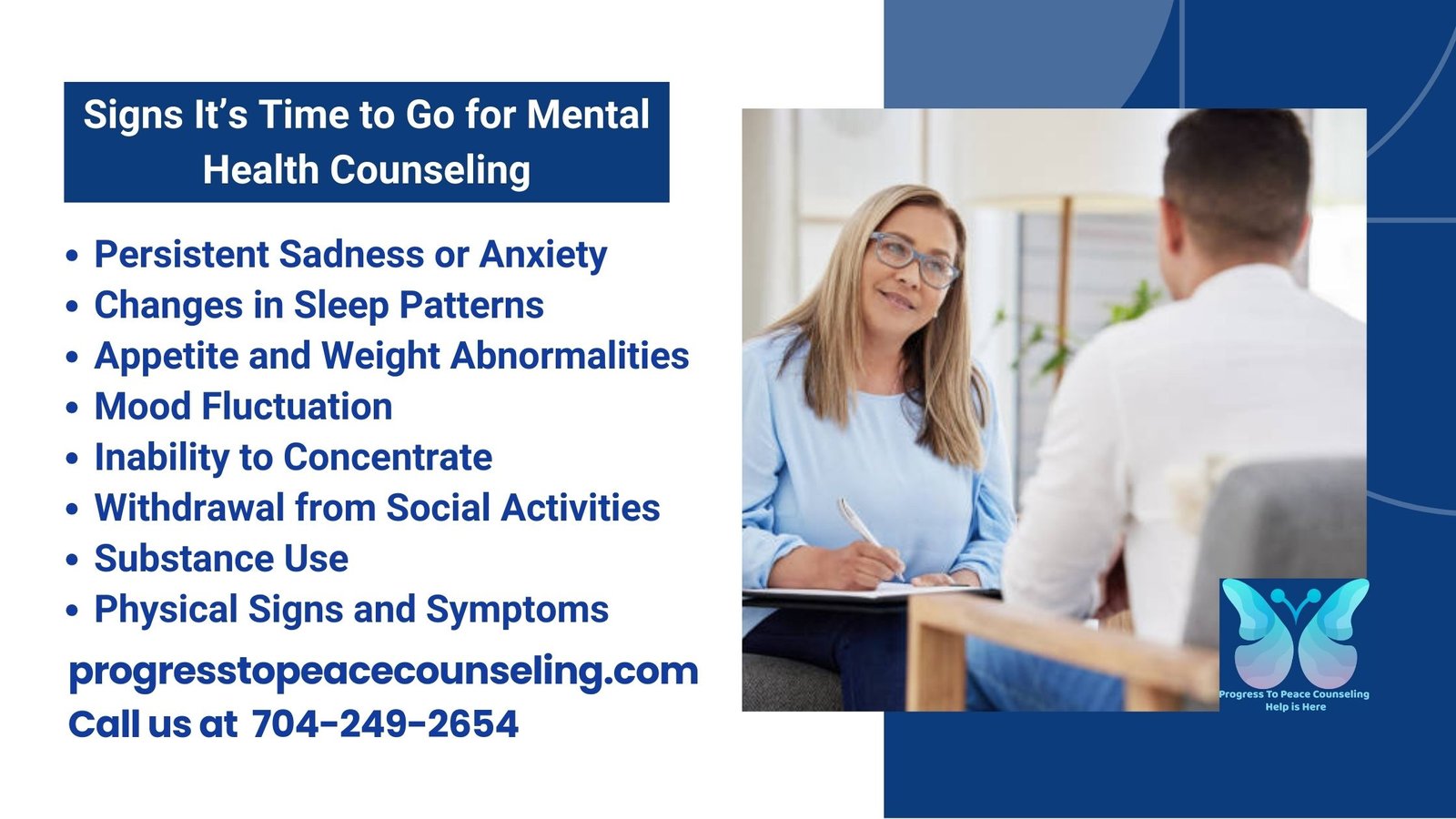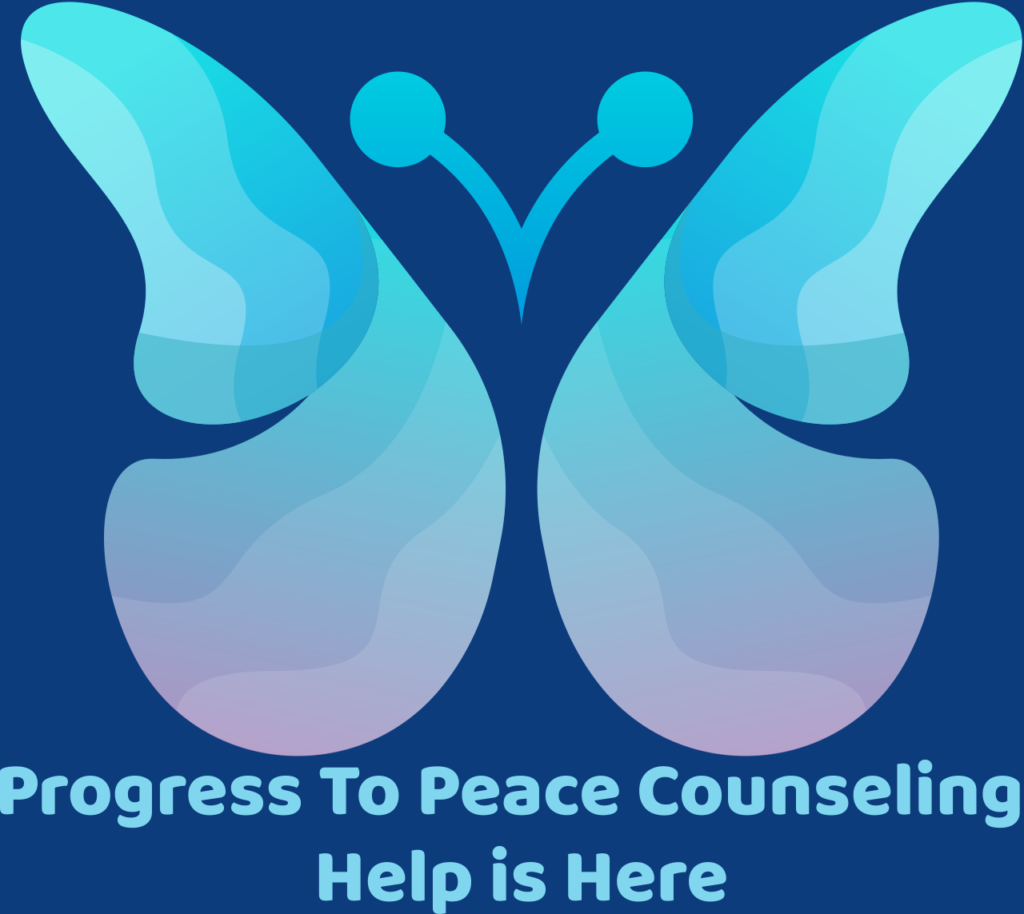One can brush aside the temporary inconvenience of signs of stress, anxiety, or sadness, believing that they might go away on their own. But how does one distinguish between normal stress and when the situation needs the services of a professional? When should one see a mental health counselor in Charlotte NC?
Signs It’s Time to Go for Mental Health Counseling
Knowing it is the right time to seek the assistance of mental health counseling begins with realizing the signs showing that all could not be well. The signs may be expressed in some different ways in regard to our thoughts, feelings, behaviors, or be reflected in our physiological state. Here are some common indicators that might suggest it’s time to seek professional support.
1. Persistent Sadness or Anxiety
Being persistently sad or anxious over time, where nothing seems to lift your spirits, could be indicative of a deeper problem like depression or an anxiety disorder.
2. Changes in Sleep Patterns
When you start experiencing insomnia, waking up frequently during the night, or even oversleeping, these are some of the subtle signs that something might be wrong with your mental health.
3. Appetite and Weight Abnormalities
It may indicate conditions such as depression or eating disorders—overeating or complete loss of appetite.
4. Mood Fluctuation
Drastic mood swing or frequent changes in mood, which might seem off-scale in the context, can be harmful.
5. Inability to Concentrate
Consistent failure in concentration or making decisions that affect your daily life can be a probable sign of an existing mental illness.
6. Withdrawal from Social Activities
A loss of interest in activities that were once pleasurable or withdrawal from other people is a sign of depression or other mental health concerns.

7. Substance Use
An increase in the use of alcohol or drugs as a way of coping suggests that emotions are getting out of control, which, more likely than not, can indicate potential underlying mental health issues.
8. Physical Signs and Symptoms
Unexplained physical symptoms, such as headache, digestive problems, or chronic pain, may be linked to a man’s mental state.
When Stress Becomes Overwhelming?
However, stress is just a common part of human’s life. It can be too much and become uncontrollable without help. Stressors—which are the sources of stress—such as major life changes, traumatic events, and on-going conflicts can take a toll on your mental well-being. If it becomes difficult for you to cope and distress begins to take its toll on daily activities, then probably it’s time to consult with a mental health counselor.
Impact on Daily Functioning
One of the most defining points to consider in counseling is when your ability to function effectively in most or all areas of your life suddenly becomes arrested by your mental health.
This may involve:
- Work or Academic Performance: Not being able to concentrate, frequent absences, or a decline in performance at work or school.
- Relationships: Like tough relationships with family, friends, or colleagues due to excessive mood swings, irritability, or withdrawal.
- Neglect of Self-Care: Neglect of self-care schedules like hygiene, exercise, or proper nutrition due to lack of motivation or energy.
- Daily Responsibilities: Finding it harder and harder to keep up with the house, bills, or dependents.
Feeling like this constantly is capable of affecting these areas of life due to problems that are often far beneath the surface; seeking a mental health counselor has the ability to provide you with the tools and resources you need to regain that balance and help enhance your quality of life.
Benefits of Mental Health Counseling
The decision to enroll in mental health counseling services remains individualistic and could primarily be influenced by needs for emotional suffering relief, better-coping mechanisms, or higher self-realization. Some possible benefits for considering counseling include:
- Emotional Support: In counseling, you have a safe and non-judgmental space for ventilating means and emotions.
- Coping Strategies: The counselor will teach you effective coping strategies and techniques over days for handling your mental anguish, stress, or depression.
- Healthy Relationships: Counseling can help enhance your communication skills and also elevate your ability to form and maintain healthy relationships.
- Exploration of Self: It enables one to explore the underlying concerns, attain self-awareness, and develop a better discovery of self.
- Personal Development: Counseling helps in personal growth, fortitude, and self-concept development.
Overcoming Stigma
Even if the society of today is more attuned to recognizing and accepting mental health issues, the element of stigma runs a serious potential. Care should be emphasized that consultation with a counselor indicates strength and not weakness on the part of any individual. Comparably, humans should take care of their mental health with the same amount of attention that they give to their physical health.
Mental health resources will vary from individual counseling to group therapy and even some highly specialized treatment programs. One of the first and most important proactive steps you can take toward a successful rehabilitating experience is finding a good counselor. This is someone who understands you and with whom you can begin to feel comfortable.
Types of Counseling
Counseling approaches differ depending on goals, concerns, and preferences including.
- Cognitive-Behavioral Therapy (CBT): It identifies and changes negative thought patterns and bad behavior.
- Psychodynamic Therapy: This therapy looks into those processes in the unconscious mind and past experiences for any effect on today’s behavior.
- Mindfulness-Based Therapy: This involves applying mindfulness techniques to higher levels of self-awareness and lowering levels of stress.
- Family or Couples Therapy: This helps to resolve relationship issues and improve communication in families or between couples.
The right approach will depend on your individual needs and goals from therapy. A competent counselor would walk side by side with you in establishing a working treatment plan based on your preferences and therapeutic goals.
Taking the First Step
If you are unsure about counseling being the most appropriate choice for you, it may be useful to schedule an initial consultation with a mental health counselor. During that visit, you will be able to articulate your concerns relative to your treatment and ask any important questions about the counseling process while determining whether you would feel at ease with this counselor.
Remember, you don’t have to face the challenges alone since looking for help is one of the positive steps toward improving your state of mental health and emotional well-being. Whether you’re struggling with relationship problems, anxiety, stress, depression, or just difficulty in relationships, counseling can help you gain important insight, tools, and support also to be able to weather and work through life’s many challenges from a place of struggle with more ease and grace.
Bottom Line
When to get mental health counseling includes knowing when your emotional condition may need the intervention of a professional. These range from persistent sadness and anxiety to failure in functioning day to day. Mental health councelor can assist individuals in conquering mental issues and developing living standards.
Making the decision to become involved in Progress To Peace Counseling is a choice of renewal of interest in your personal development and well-being. Standing beyond the stigma, reaching out for support, and learning more effective strategies to cope build one’s health and well-being. It offers a healing resurgence and renewed insight into the challenges of life. Take the first step today and make a healthier tomorrow because your mental health truly does matter!














